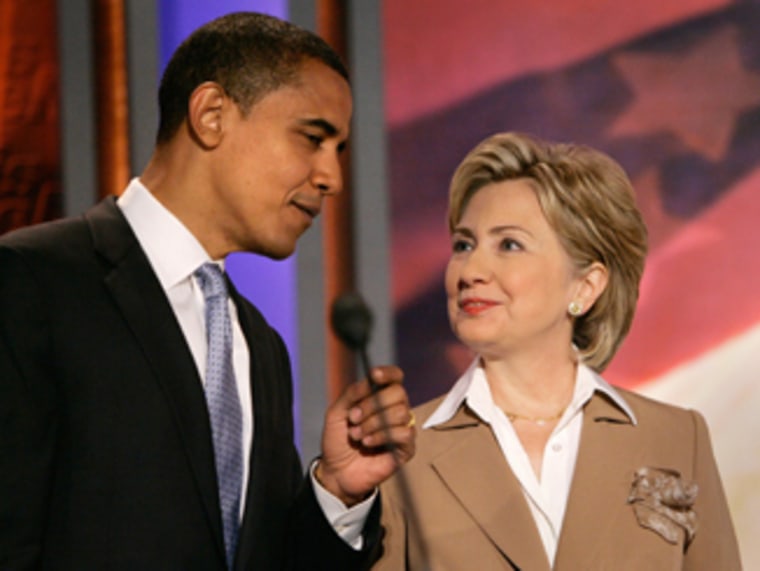Democrat Barack Obama on Sunday tried to parlay his relative lack of national experience into a positive attribute, chiding his rivals for adhering to "conventional thinking" that led the country to war and that has divided the country.
In their latest debate, the candidates also said they favored more federal action to address economic woes that have resulted from a housing slump and tighter credit. New Mexico Gov. Bill Richardson said the current financial crisis was "the Katrina of the mortgage lending industry."
Prodded by moderator George Stephanopoulos at the outset of the debate, Obama's rivals critiqued his recent comments on Pakistan and whether he would meet with foreign leaders - including North Korea's head of state - without conditions.
"To prepare for this debate I rode in the bumper cars at the state fair," the first-term senator from Illinois said to laughter and applause from the audience at Drake University.
Iowa and international diplomacy
The debate capped an intense week of politicking in Iowa, an early voting state in the process of picking a nominee. The Iowa State Fair is a magnet for White House hopefuls each presidential election. This year was no exception, especially for Democrats who swept into the state after a GOP straw poll last week.
Sen. Christopher Dodd, D-Conn., directly addressing a question about Obama's relative inexperience, said: "You're not going to have time in January of '09 to get ready for this job." Dodd has served in Congress for more than 30 years.
Former Sen. John Edwards said Obama's opinions "add something to this debate." But Edwards, the 2004 vice presidential nominee, said politicians who aspire to be president should not talk about hypothetical solutions to serious problems.
"It effectively limits your options," Edwards said, drawing agreement from Richardson.

Obama said he could handle the rigors of international diplomacy and noted that many in the race, including Dodd, Edwards and Sens. Hillary Rodham Clinton and Joe Biden, voted to authorize the Iraq war in 2002.
"Nobody had more experience than Donald Rumsfeld and Dick Cheney and many of the people on this stage that authorized this war," Obama said. "And it indicates how we get into trouble when we engage in the sort of conventional thinking that has become the habit in Washington."
Electability
The debate, hosted and broadcast nationally by ABC, took place less than five months before Iowa caucus-goers begin the process of selecting the parties' presidential nominees.
Obama, who has criticized Clinton as a divisive figure, portrayed himself as the candidate who "can bring the country together around a common purpose and rally us around a common destiny."
Clinton, under attack from outgoing Bush counselor Karl Rove, said the president chief's political strategist is "obsessed with me." She presented a different view of politics than Obama did, arguing that negative campaigning is inevitable no matter who gets nominated.
The New York senator and former first lady said no one will escape the "Republican attack machine." She added, "I know how to beat them."
Pocketbook issues
Several candidates urged the Federal Reserve Bank to lower more interest rates as a response to upheaval in the financial markets and the crisis with home mortgages. On Friday the Fed cut the interest rate on loans to banks, causing an upturn in the stock market. But many Wall Street analysts have been demanding more, including lower interest for consumers and businesses.
"It can't be just left to a bailout of the banks," Clinton said.
Edwards, criticized for investing in a hedge fund linked to lenders that have foreclosed on Hurricane Katrina victims, called for a "home rescue fund" to help homeowners who are at risk of defaulting on their mortgages.
Biden blamed hedge funds and private equity firms, which have invested in many of the lenders. He wants them to have to disclose more of their transactions. "They are the ones that are causing this thing to go under," he said.
Dodd, chairman of the Senate Banking, Housing and Urban Affairs Committee, predicted the Fed would lower more interest rates in September. He also pressed the Bush administration to loosen credit limits for Freddie Mac and Fannie Mae, the government-sponsored entities that buy mortgages.
Special interests
Obama used the crisis as an opportunity to assail lobbyists. Obama and Edwards, both of whom have declined lobbyists contributions in the presidential contest, are trying to gain the upper hand on government ethics in the campaign.
"This is where special interests have been driving the agenda," Obama said, regarding the need for more regulation.
The Democratic presidential front-runners also seemed to agree on one other thing: The schedule of candidate forums and debates has become overwhelming.
David Plouffe, Obama's campaign manager, said Saturday, "We simply cannot continue to hopscotch from forum to forum and run a campaign true to the bottom-up movement for change that propelled Barack into this race."
He said Obama was committed to five remaining debates sanctioned by the Democratic National Committee, two Iowa debates in December and one in Florida on Sept. 9. But after that, Plouffe said, the campaign will limit the number of debates Obama attends.
Other campaigns have grumbled privately about the same thing and some will probably follow suit. The forums are virtually the only way for lesser-known candidates such as former Sen. Mike Gravel and Rep. Dennis Kucinich to get attention.